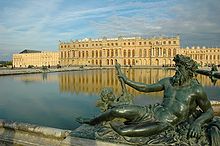Grand Siècle
- View a machine-translated version of the French article.
- Machine translation, like DeepL or Google Translate, is a useful starting point for translations, but translators must revise errors as necessary and confirm that the translation is accurate, rather than simply copy-pasting machine-translated text into the English Wikipedia.
- Consider adding a topic to this template: there are already 6,178 articles in the main category, and specifying
|topic=will aid in categorization. - Do not translate text that appears unreliable or low-quality. If possible, verify the text with references provided in the foreign-language article.
- You must provide copyright attribution in the edit summary accompanying your translation by providing an interlanguage link to the source of your translation. A model attribution edit summary is
Content in this edit is translated from the existing French Wikipedia article at [[:fr:Grand Siècle (histoire de France)]]; see its history for attribution. - You may also add the template
{{Translated|fr|Grand Siècle (histoire de France)}}to the talk page. - For more guidance, see Wikipedia:Translation.

Grand Siècle or Great Century refers to the period of French history during the 17th century, under the reigns of Louis XIII and Louis XIV.[2]
The period was notable for its development of art and literature, along with the construction of the Palace of Versailles, the effects of the French Wars of Religion, and the impacts of the Thirty Years' War.[2][3] Significant figures during this period include gardener André Le Nôtre, architect François Mansart, painter Nicolas Poussin, painter Philippe de Champaigne, painter Charles Le Brun, playwright Molière, poet Jean de La Fontaine, playwright Jean Racine, playwright Pierre Corneille, writer Charles Perrault,[4] composers Henri Dumont, Jean-Baptiste Lully, Marc-Antoine Charpentier, Michel Richard Delalande, André Campra, Henri Desmarest, Marin Marais and François Couperin, philosophers Rene Descartes, Blaise Pascal, Antoine Arnauld and the Port-Royal, Nicolas Malebranche, Pierre Gassendi, La Rochefoucauld, La Bruyere, and Pierre Bayle.[2]
See also
References
- ^ Blanning, T. C. W. (2002). The Culture of Power and the Power of Culture: Old Regime Europe 1660–1789. Oxford University Press. p. 33-44. doi:10.1093/acprof:oso/9780198227458.001.0001. ISBN 978-0-1982-2745-8.
- ^ a b c "The Grand Siecle & The Age Of Enlightenment". France.fr. Retrieved April 26, 2019.
- ^ Bluche, François (2005). Dictionnaire du Grand Siècle 1589-1715 (in French). Fayard. ISBN 978-2213621449.
- ^ Montoya, Alicia (2013). Medievalist Enlightenment: From Charles Perrault to Jean-Jacques Rousseau. DS Brewer. ISBN 9781843843429.











